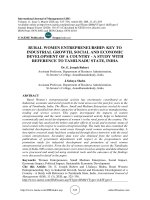Economic growth and economic development 270
Bạn đang xem bản rút gọn của tài liệu. Xem và tải ngay bản đầy đủ của tài liệu tại đây (171.69 KB, 1 trang )
Introduction to Modern Economic Growth
6.1. Brief Review of Dynamic Programming
Using abstract but simple notation, the canonical dynamic optimization program
in discrete time can be written as
Problem A1
∗
:
V (x (0)) =
sup
{x(t+1)}∞
t=0
∞
X
β t U (x (t) , x (t + 1))
t=0
subject to
x (t + 1) ∈ G(x (t)),
for all t ≥ 0
x (0) given.
where β ∈ (0, 1), and x (t) is a vector of variables, or more formally, x (t) ∈ X ⊂ RK
for some K ≥ 1. G(x) is a set-valued mapping, or a correspondence, also written as
G:X ⇒X
(see the Mathematical Appendix), thus the first constraint basically specifies what
values of x (t + 1) are allowed given the value x (t). For this reason, we can think
of x (t) as the state variable (state vector) of the problem, while x (t + 1) plays the
role of the control variable (control vector) at time t. Therefore, the constraint
x (t + 1) ∈ G(x (t)) determines which control variables can be chosen given the
state variable. The real-valued function U : X × X → R is the instantaneous
payoff function of this problem, and we have imposed that overall payoff (objective
function) is a discounted sum of instantaneous payoffs.
In the problem formulation, we used “sup” rather than max, since there is no
guarantee that the maximal value is attained by any feasible plan. However, in all
cases studied in this book the maximal value will be attained, so the reader may
wish to substitute “max” for “sup”. When the maximal value is attained by some
∞
sequence {x∗ (t + 1)}∞
t=0 ∈ X , we refer to this as a solution or as an optimal plan
(where X ∞ is the infinite product of the set X, so that an element of X ∞ is a
sequence with each member in X).
Notice that this problem is stationary in the sense that the instantaneous payoff
function U is not time-dependent; it only depends on x (t) and x (t + 1). A more
general formulation would be to have U (x (t) , x (t + 1) , t), but for most economic
256









